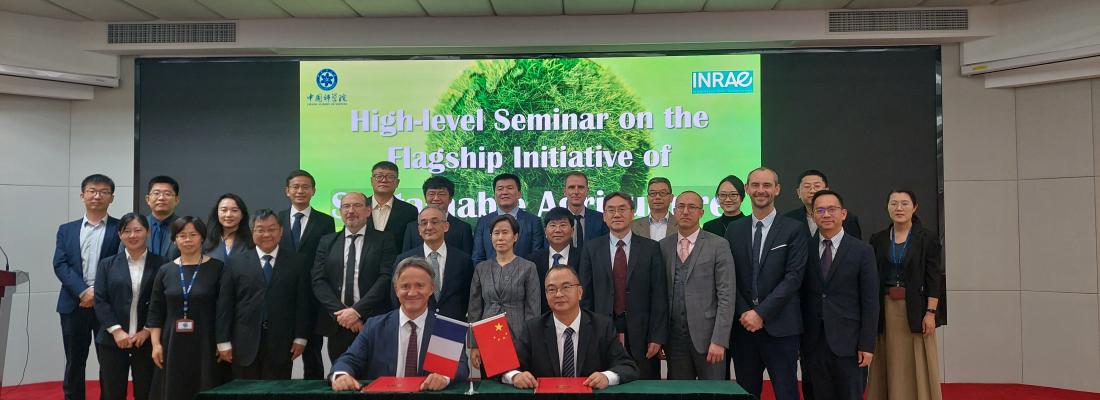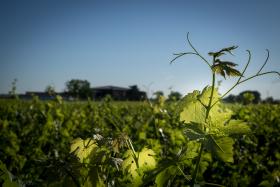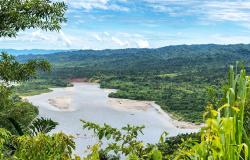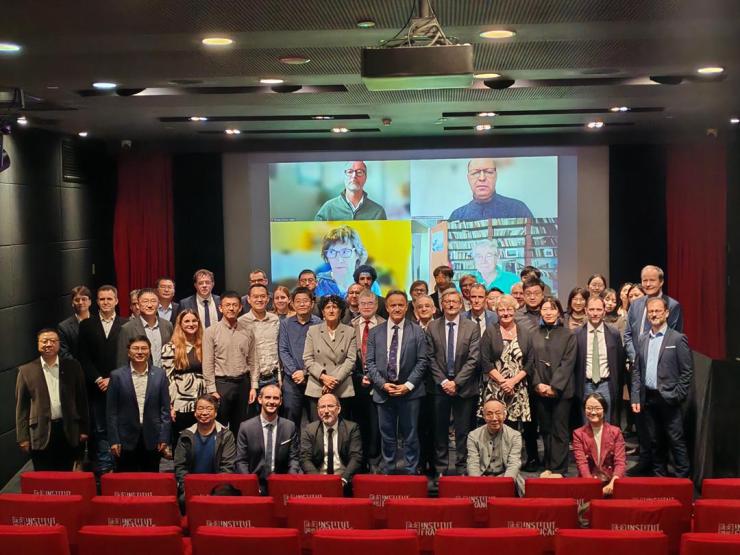Seven agreements signed in China to structure scientific cooperation between INRAE and its partners
In China, an INRAE delegation has signed seven scientific agreements with some of the country’s leading scientific institutions on carbon neutrality, agroecology, biodiversity, plant genetics, nutrition and sustainable livestock farming. These commitments confirm existing partnerships, lay the foundations for new joint projects to address major agricultural and environmental challenges, and are accompanied by the opening of an INRAE/CIRAD office at the French Embassy in Beijing.
Published on 15 October 2025

INRAE and CIRAD represented at the French Embassy in Beijing
The new INRAE-CIRAD office, inaugurated on 8 October and located at the Embassy of France in Beijing, marks a new milestone in building France’s scientific presence in China.
“ Established alongside the representations of major French research organisations, notably CNRS, CEA and CNES, this official presence reflects INRAE’s well-established role in France’s diplomatic and scientific activities in a country that is key to the future of agricultural and environmental research.” Philippe Mauguin, INRAE Chair & CEO
The new office will enable INRAE and CIRAD to more closely coordinate projects on the ground, support researchers on assignment in China and strengthen cooperation with Chinese scientific partners.
Long-standing cooperation with the Chinese Academy of Agricultural Sciences (CAAS) continues
Also during the visit, two key projects were confirmed with the Chinese Academy of Agricultural Sciences (CAAS), INRAE’s direct counterpart in China and long-standing partner: the renewal of the BIPI international associated laboratory (LIA), and a letter of intent to continue research on wheat genomics via the Wheat WGP-II LIA.
- The BIPI 2 Integrated plant biology and physiology LIA will pursue research launched in 2019 on interactions between integrated biology, plant physiology and the environment, to gain further insight into the adaptation mechanisms of plants subject to multiple pressures.
- The Wheat Genomics 2 LIA will focus on genomics, the improvement of wheat and more specifically on the selection of varieties that are most resilient to climate stress. Research will combine genetics, phenotyping and modelling as priorities for this LIA, which also launched in 2019.
Several high-level articles have already been published during the first iterations of these two LIAs, supported by the complementarity of the French and Chinese teams.

Find out more
Two French-Chinese joint laboratories dedicated to plant biosecurityJoint laboratories established by INRAE and China are fostering scientific cooperation on major agricultural and environmental challenges. Two of these LIAs, BIPi and IFOPE, are emblematic examples of efforts to improve plant biosecurity.
A joint research programme with the Chinese Academy of Sciences (CAS) to address major agricultural challenges
INRAE and the Chinese Academy of Sciences (CAS), China’s leading scientific institution, officially signed a joint linkage call (JLC)[1], a bilateral programme that will support the reciprocal mobility of researchers and doctoral students at both institutions, starting in 2026. Designed as a framework for long-term cooperation, this initiative focuses on four scientific priorities:
- Agroecology and climate
- Soil science
- Water management and remote sensing
- Plant genetics and nutrition
The programme will build on existing partnerships, such as the Innogrape LIA, focused on research for the adaptation of grapevine to climate change.

A research laboratory to meet the challenges facing viticulture
Established in 2018 and renewed in 2024, Innogrape is run by the Ecophysiology and Functional Genomics of the Vine (EGFV) joint research unit at INRAE Bordeaux and the Institute of Botany of the Chinese Academy of Sciences.
French and Chinese Innogrape teams work together on the challenge of adapting grapevines to climate change, for example via the selection of stress-resistant varieties, modelling of environmental effects on grape quality, and large-scale sequencing of grapevine varieties. This is a strategic partnership given that both countries are among the world’s leading grapevine producers.
On the horizon: cooperation on water management in agriculture
The INRAE delegation also visited the Aerospace Information Research Institute (AIRCAS), part of the Chinese Academy of Sciences - a key player in China’s research landscape in space technologies, Earth observation, environmental data processing, and artificial intelligence. The institute hosts several internationally recognised research centres, including the International Research Center of Big Data for Sustainable Development Goals (SDGs).
As part of a dialogue initiated in late 2024 on these issues, the visit provided an opportunity to confirm a shared scientific interest in the application of advanced technologies to agricultural water management. Remote sensing of water resources and crop and forest water demand, modelling of the water cycle, and integrated analysis of climatic, hydrological, and agricultural data were among the key topics discussed. These themes resonate strongly with the One Water Vision initiative, for which INRAE serves as secretariat. Identified as priority areas under the Joint Linkage Call connecting the two institutions, they could form the basis for a future structured joint project.
“These technologies enable us to reach a new milestone. Remote sensing makes it possible to characterise large-scale water dynamics within agroecosystems, not only surface water resources but also the degree of crop water stress at the plot level, thereby contributing to optimised irrigation management. This paves the way for observation-based services. The One Water Vision initiative aims to structure this approach at the international level, by linking spatial data, hydrological models, and territorial water management policies.” Jean-François Soussana, INRAE International Advisor

Find out more
One Water Vision: an international coalition supported by advances in satellite technologyOne Water Vision is an ambitious international programme aimed at enhancing water resource management through innovative tools and global scientific collaboration. The SWOT and TRISHNA satellite missions, with their data of unprecedented accuracy, will play a key role in complementing existing services and improving our understanding of water cycles, even in the most remote regions.
Strengthening the scientific framework for sustainable agriculture at China Agricultural University (CAU)
Among INRAE’s long-standing partners in China is the China Agricultural University (CAU), the country’s top agricultural university and a leading institution in agronomy and food sciences. This enduring partnership, which has already produced over 300 joint publications, will be reinforced with three new commitments: a renewed framework agreement, and two letters of intent to lay the groundwork for future international associated laboratories, one dedicated to agroecology, and another to sustainable livestock farming.
- The Agroecology - Green Agriculture and Sustainable Development LIA (A‑AGD 2) will build on research launched in 2020 as part of a first LIA focused on designing sustainable agricultural systems, exploring soil-plant-microbiota interactions and to developing innovative agroecological practices. The A-AGD 1 partnership has already enabled the development of a bilateral scientific community recognised for the quality of its publications and its role in training young researchers.
- The new ‘Ecobeef’ LIA, operated by INRAE and the CAU and set to launch in 2025, aims to improve feed efficiency, circularity in livestock systems and beef quality in the context of climate transition. The partnership combines complementary expertise in animal nutrition, physiology, modelling, meat sciences and consumer perception and builds on a long history of Franco-Chinese cooperation in beef cattle research initiated in the 2000s with the Centre Sino-Français de recherche sur les Bovins.
Plant phenomics: a strategic field at the heart of the partnership with NAU
The INRAE delegation also visited Nanjing Agricultural University (NAU), one of China’s most prestigious agricultural universities, internationally recognised for its plant phenotyping platforms as well as its research in genomics and crop modelling. On this occasion, the two institutions signed a Memorandum of Understanding (MoU) and initiated the signing process for the new SURPH International Associated Laboratory (LIA), dedicated to phenotyping and modelling of plant behaviour.
This partnership, launched in 2018 and already the source of thirty joint publications, brings together NAU phenotyping platforms and the French network PHENOME, central to major international projects on sustainable agriculture and climate adaptation. The partnership is part of a global network for research on phenomics and sustainable agriculture that includes Horizon Europe PHENET, AgMIP, and projects with the Commonwealth Scientific and Industrial Research Organization (CSIRO) in Australia and the University of Queensland (UQ).
Cooperation between INRAE and China showcased at two events
INRAE and its partners hosted two high-level scientific events in Beijing to mark France-China Environment Month in October (Mois Franco-Chinois de l’Environnement).
Co-hosted with the French Embassy, the events were attended by key figures from French and Chinese research communities and explored shared challenges in achieving a sustainable transition in agriculture and the environment.
- A workshop co-hosted with the Chinese Academy of Agricultural Sciences (CAAS) discussed scientific aspects of intermediate crop practices, nutrient circularity and agrosystem resilience in the face of climate change. Specialists from several Chinese and French scientific institutions shared their approaches to sustainable soil management, functional biodiversity and carbon sequestration, laying the groundwork for new large-scale joint projects.
- The following day, the Institut Français in Beijing hosted a second workshop, co-organised by INRAE and the French Embassy, which highlighted the vitality of bilateral scientific cooperation between France and China, notably thanks to instruments such as international associated laboratories and in particular those integrated to the China-France Carbon Neutrality Center.

[1] A Joint Linkage Call (JLC) is a bilateral programme of joint calls supporting scientific mobility. The selected projects fund reciprocal exchanges between researchers from INRAE and the partner organisation, with the aim of facilitating or developing a project related to the scientific themes jointly defined by both institutions.
